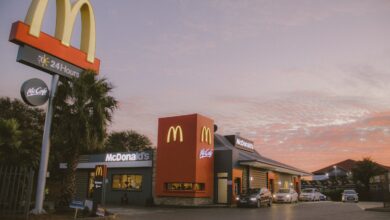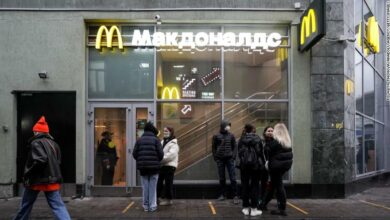
Cage-free eggs at McDonald's, bans on suspect ingredients and "healthful" options edging out junk on supermarket shelves: could America be ready to end its decades-old love affair with processed food?
US food firms and restaurant chains have been lining up to banish items perceived as unhealthy or unethical — from additive-laden snacks to industrially-farmed meats — in what experts see as a powerful trend.
"It's kind of like a whole bunch of things happening, snowballing," said Penny Kris-Etherton, a professor of nutrition at Penn State University.
Beyond the farmers' markets and organic delis that have long dotted more affluent US neighborhoods, American consumers are being wooed en masse with promises of "healthful" or "natural" foods, free of GMOs, additives and nasties.
Just this month, McDonald's said it would transition to more humanely produced eggs within 10 years, following a switch to "real" butter instead of margarine in some dishes.
Kellogg plans to banish artificial flavors and colors from its cereals, and Mondelez, maker of Ritz crackers and Oreo cookies, set itself a target of 50 percent so-called "well-being" snacks by 2020.
"It's moved from being a fringe issue in a niche market to becoming a mainstream desire," said former McDonald's chief marketing officer Larry Light.
– Polar bear with tooth decay –
The trend crosses the generations, with baby boomers seeking to avert age-associated ills as they live longer, and millennials fixated on health and ecological concerns, experts say.
Sign of the times: the bakery chain Panera Bread vowed to excise 150 "unacceptable" ingredients while Chipotle Mexican Grill said it was banning antibiotic-raised meats and would use more local produce.
Retail behemoth Walmart has told suppliers to curb the use of antibiotics in meat, a year after it began to mass market organic foods — part of a trend that saw the organic market jump more than tenfold from 1997 to 2014, to $35.9 billion.
Social media has been intensifying pressure on the food industry to clean up its act, creating the scope for negative publicity to go viral.
Photos of hens stuffed in cages, for instance, helped spur passage of a California referendum in 2008 guaranteeing the birds adequate conditions.
Likewise, Coca-Cola was put on the defensive by a 2012 video that showed its iconic polar bear suffering the consequences of diabetes and tooth decay. The soda giant has since promised a push on smaller-pack and lower-calorie drinks.
– Public relations not public health –
Once-mighty brands such as Nestle's "Lean Cuisine" frozen meals are downplaying the "diet" argument to focus instead on their use of organic ingredients.
"People are looking for healthier lifestyles and a lot of that is perception that the more manufacturing there is, the less healthful it is," said Light, who now chairs the brand management consultancy Arcature.
"'Fresh' is a signal of healthier than processed," he said, even though "it may have just as many calories."
And here comes the tricky part.
Michael Jacobson, executive director for the Center for Science in the Public Interest, said many of the changes trumpeted are just window-dressing in health terms.
He praised Panera for eliminating artificial food dyes and trans-fats as part of a "food as it should be" campaign. But he explains that other items on its blacklist, such as sodium lactate, while they may sound problematic, are actually benign.
"Those moves are more about public relations than public health," said Jacobson.
Look closer, and the "healthful" food" effect may do little to address the obesity crisis which now affects some 78.5 million American adults, bringing increased risks of diabetes and heart disease.
In 2013, obesity affected more than a quarter of the population in 43 US states, according to the Centers for Disease Control and Prevention (CDC).
– 'Load up the calories' –
"You need to look at the fine print," said Jacobson.
He criticized Chipotle, whose motto is "Food with integrity," for continuing to serve food "loaded" with sodium, while offering few fruits and vegetables.
A Chipotle burrito made with chicken, white rice, salsa, beans, cheese and sour cream still has about 1,050 calories and 2,085 milligrams of sodium. Scoop on the cheese, guacamole or second meat options, and you push those counts up to half an adult's daily recommended calories and all of the sodium.
"What people want is food that's a little bit healthier," said Light. "'Healthier' doesn't mean it's perfectly healthy."
"You could take a perfectly 'healthy' option and load up the calories," agreed Kris-Etherton, who serves on nutrition advisory boards for McDonald's and the American Heart Association.
"The key thing is people just have to be knowledgeable."
– 'Heart Attack Grill' –
That touches on a core issue, since studies suggest a sizeable chunk of the American public is content to keep knocking back the quarter-pounders.
This is, after all, the home of the "Heart Attack Grill" — a notorious Las Vegas restaurant whose tongue-in-cheek menu boasts the Guinness world record for the highest calorie burger.
One third of US children eat pizza or other fast food every day — about the same as in the 1990s — according to a study released this month by the CDC.
Fifty-five percent of Americans who rated their health as "very good" or "excellent" were in reality obese or overweight, according to an annual survey by the International Food Information Council Foundation.
The same study found that just half of US consumers were concerned about the healthfulness of their diet, with health rated as less important than either taste or price.
And so, it seems, the quick-fix snacks are here to stay.
"There's a proper place for treats in a balanced diet," summed up Mondelez chief growth officer Mark Clouse. "We're not turning everything into health food."




